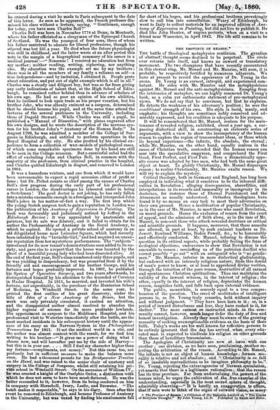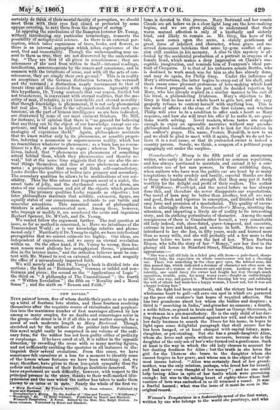THE PROVINCE OE MASON..
THE battle of theological metaphysics continues. The gyration of abstract: thought seems destined to be perpetual. The circle ever returns into itself, and knows no onward or translatory movement. The two champions that have recently encountered in this eternal ring, Mr. Mansel and Mr. Maurice, will soon, it is probable, be respectively fortified by numerous adherents. We have at present to record the appearance of Dr. Young in the arena. Dr. Young is an earnest, intrepid, and experienced com- batant. He aides with Mr. Maurice and the metaphysicians against Mr. Mansel and the anti-metaphysicians. Escaping from the intricacies of metaphor, we can highly commend Dr. Young's book, as a calm yet enthusiastic statement of pro-metaphysical views. We do not say that he convinces, but that he explains. He detects the weakness of his adversary's position; he sees the conditional strength of his own. His style is lucid, manly, and emphatic ; his thoughts are sometimes nobly conceived and ad- mirably expressed, and his erudition is adequate to his purpose. It will be remembered that Mr. Manse', zealous for the main- tenance of revealed religion, exhibited, about a year ago, a sur- passing dialectical skill, in constructing an elaborate series of arguments, with a view to show the incompetency of the human reason to explore the region of transcendent ideas, or those which lie beyond experience—the infinite, the absolute, the eternal ; while Mr. Maurice, on the other hand, equally zealous in the cause of Christian truth, contended that the human reason can soar into the speculative empyrean, and comprehend the First Good, First Perfect, and First Fair. Here a diametrically oppo- site course was adopted by two men, who had both the same great object at heart. To glorify Christianity, Mr. Mengel disparages reason; to realize Christianity, Mr. Maurice exalts reason. We will try to explain the mystery.
i
Critical theology, both in Germany and England, has long been employed in indicating what it conceives to be the inherent diffi- culties in Revelation ; alleging discrepancies,. absurdities, and i interpolations in its records and immorality or incongruity in its doctrines, for instance those of Eternal Punishment and the Atonement as usually understood. Orthodox theologians have found it by no means an easy task to meet -their adversaries on their own ground. Hence a modification of popular Christianity, as in the case of Mr. Maurice to meet those who assail Revelation, on moral grounds. Hence die exclusion of reason from the court of appeal, and the admission of faith alone, as in the case of Mr. Manse', to non-suit those who attack revealed doctrines on critical and scientific grounds. It happens, moreover, that these assaults are allowed, in part at least, by such eminent teachers as Dr. Jewett, Rowland Williams, Baden Powell, &c., to be honourably and effectively conducted. Mr. Mansel, refusing to discuss the question in its critical aspects, while probably feeling the force of neological objections, endeavours to shew that Revelation is not amenable to reason ; reminding us of the patrician duellist who cannot possibly "go out" with an antagonist who is " no gentle- man." Mr. Maurice, inferior in mere dialectical gladiatorship, but endowed with an intensely religious nature, finds this denial of man's power to know, or at least to apprehend divine verities, through the intuition of the pure reason, destructive of all earnest and spontaneous Christian spiritualism. Thus one maintains the validity of the inward witness, in the interest'of religion ; the other, equally in the interest of religion, depreciates the human reason, magnifies faith, and falls back upon external evidence. The public, meanwhile, is scarcely equal to a true compre- hension of the question. The creed of multitudes of intelligent persons is, as Pr. Young truly remarks, held without inquiry and without judgment. ' They have been bernyte ; or in a period of inward disturbance and fear, they have rushed to it, for shelter." The more earnest or instructed,ininds r-An the Qom- munity cannot, however, muck longer defer the duty, of free and honest investigation. Already they must beinware of the growing necessity of seeking unexceptionable evidence as the basis of their faith. Pale.y's works are too vgell-known for rellective,persons to be entirely ignorant that the day has arrived when;ievery edu- cated man is expected to Vindicate his religion on oer grounds than those of hereditary transmission. The" of Christianity are now at issue with one another ; one division, as we have seen, proclaiming, another re- jecting the arbitration of the reason. Aecording to Mr. Mansel, the infinite is not an object of human knowledge ; ilmatnan mo- rality is relative and not absolute ; and `f Ahriatpascity is as full of as insoluble contradictions as he imagiaeis philosophy to be." Dr, Young, rejecting the extravagancies 91;ciarms.a...appisigation, hasasserts that there is a legitimate rationalemb; rtheit,gya reason hai its true province. Far from undervalumg„thelowere of the human mind, he urges the eultivatien of the.fretkneercise of the understanding, especially in the most sacred -splaerf 4, thought, admirably observing—" It is hardly, an exaggeratin to affirm, that if men were to think of the organ of outward vision, as many • The Province of Rosins ; a Criticism of file BaMpton Lecture oti " The Limits of Religious Thought." By John Young, LL.D. Published by Smith and Elder. Meet tger.- 0ertain/41§. naqt, mental faculty 'of perception, we should t.lann.:', eyes fast closed or protected by. some
oPaque„ Alive them from the danger of Seeing."
In of. .ilenncliisions of the Bampton lecturer Dr. Young, witho
_ an riip particular 'terminology, reasserts the
Possibi o me p ysica y l science. 'As there is a exte-rind, per- ception, which takes cognioonce of trees, books, and flowers, so there is an internal.„,nrcAption whioLtitkes...co,gnizanee of the soul, God and immortality. Though the understanding. may. as- sent to-them as truei:Ithey, are not discovered by the understand;. ing " They are firet of all given in consciousness ; they .are
Utterances of the soul from to itself—internal readings,
intellections., announcements by the reason and-conscience, and in &admen with the intuitions of sense, and with all the acts of con- scibusness, they are simply their own ground." This is in reality an acceptance of the German distinction between the vernunft and the .verstand; a distinction nearly tantamount to that of innate ideas and ideas derived from experience. Agreeably with this hypothesis, Dr. Young contends that our reason, limited but not treacherous, , in conversant with eternal realities, that the mo- rality of man, ifelaq'te, is yet immutable and eternal morality : that though kno*ledge is phenomenal, it is not only phenomenal but real also. It iS.ctear to the advanced student that such pre- tensions,. on the part of human intelligence as are mere indicated,. are disavowed by some of our most eminent thinkers. 3Ir. Mill; for instance; is of opinion that there is "no ground for believing that anything ean,be the object of our knowledge except our ex- perience, and what can be inferred from our experience by the analogies of experience itself." Again, philosophers maintain that we know matter' only by its phenomena, or sensible proper- ties, inferring a noumenon or Supersensuous reality, which-has no resemblance whatever to phenomena ; as a burn has no.resem blance to a fire, or sweetness to sugar ; whereas. Dr. Young be- lieves, indeed, that " phenomena are phenomena of, something actual behind them, which they Phenomenize and thereby re- veal'," but at the same time suggests that they arc also the ac7 tual :things themselves, and thus at once phenomena and non- melte ; a • proposition that many will think self-contradictory. Locke divides the qualities of bodies. into primary and secondary. The secondary qualities he. allows to be modifications of our sen- sibility. Thus the blue colour and fragrant scent .of asiolet, • the sweet taste of jelly, and the rhythmical sound of a drum, are states of our consciousness and not of the objects which produce them; The' priniary .■pialities Locke regards as objective ; 'but later philosophers maintain that solidity, extension, figure, are equally states of our consciousness, referable 'to our tactile and muscular sensations. This. canonical creed of philosophical' thinkers is seldoth controverted now. Among- those, however, who impugn or modify it, are numbered the;acute and ingenious , Herbert Spencer, Dr. M'Cosh; iand:Dr. Young. We cannot follow the argument further. The real question at issue, as far as method is concerned, is: Have we intuitions of the Transcendent -World ; or is our knowledge relative and pheno- menal only Y Manifestly if Dr.:Young be right, we have intellectual prerogatives that we cannot estimate too highly. Our ideas, are independent of experience, and we carry an eternal revelation within us. On the.Other band, if Dr. Young be wrong, then hu- man reason• must" abdicate her metaphysical throne, pinnacled diM in the intense inane," and the orthodox belieVer must be con- tent with Mr. Menselto rest'on external evidences, and magnify the office of a miracUlOusly imparted faith. We will merely add. that Dr. Young's book is divided into six sections ; thefirst on "Rationalism," German or infidel and non- German and 'pious ; the second on the " Applications of Logic" ; the, third on A philosophy: of ,The Ilneenditienal" ; the fourth on " Written Revelation ; the fifth on "Morality and a Moral Sense " ; and the sixth on " Reason and., Faith."



























 Previous page
Previous page